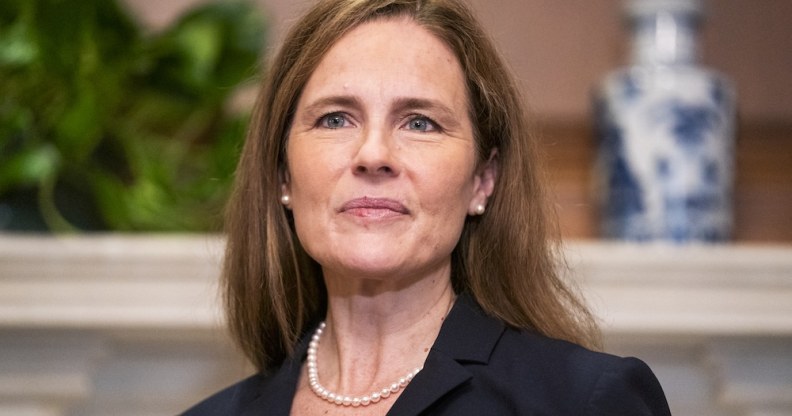Supreme Court abortion case could lead to more attacks on human rights – including LGBT+ rights

Supreme court justice Amy Coney Barrett is regarded as a conservative. (Getty/Jim Lo Scalzo-Pool)
This week, the US Supreme Court will hear Mississippi’s case for overturning the Roe v Wade decision that federally guaranteed the right to an abortion.
Mississippi is asking the Supreme Court to uphold the state’s ban on most abortions after 15 weeks of pregnancy by overturning Roe v Wade, potentially devastating reproductive rights across the US.
It is also looking for the courts to overrule the Planned Parenthood v Casey decision, in 1992, which prevents states from banning termination before the point of viability (a foetus is only viable outside of the womb when a pregnancy has reached around 24 weeks).
The Supreme Court has never ruled in favour of an abortion ban before viability.
Although it heard arguments relating to the Texas SB 8 ban on abortion after six weeks, before most people are aware they are pregnant, it did not rule on the constitutionality of the ban. Instead, it declined to intervene while a court challenge goes ahead.
But advocates for reproductive rights are nervous.
The Mississippi case marks the most serious challenge to Roe v Wade in decades, and the court hearing the arguments, beginning on 1 December, has a 6-3 conservative majority thanks to Donald Trump.
Shannon Brewer, Jackson Women’s Health Organization, the only abortion clinic in the whole of Mississippi, told ABC: “This is the most worried I’ve ever been.”
Supreme Court abortion case could ‘diminish’ the 14th amendment
The granting of abortion rights across America relied on the Supreme Court’s interpretation of the fifth and 14th amendments of the US constitution.
Both amendments guarantee that no one shall be “deprived of life, liberty, or property, without due process of law”. According to the court’s interpretation, the right to privacy falls under “liberty”, and therefore so does the right to an abortion.
But other rights relating to bodily autonomy, including contraception and same-sex marriage, also rest on this interpretation, and are classed as “due process rights”.
Marshall Martinez, executive director of Equality New Mexico, told the non-profit news organisation New Mexico Political Report: “There is a real possibility that if this court said Roe was wrongly decided, it never gave us the right to privacy, then there could be other challenges.”
Lawyer Laura Schauer added: “Generally, any diminishment of the 14th amendment could have a ripple effect but it depends on how they do it.”
The potential “diminishment of the 14th amendment”, which would result in a diminishment of the right to privacy and bodily autonomy, could topple a multitude of LGBT+ rights, from marriage equality, to gender-affirming healthcare, to sex itself.
For example, in the 2001 case Lawrence v Texas, the Supreme Court ruled that state sodomy bans were unconstitutional, and based this decision on the 14th amendment.
But Justice Clarence Thomas, who still sits on the Supreme Court today and is currently in the company of five other conservative justices, dissented at the time.
He wrote: “I can find, neither in the Bill of Rights nor any other part of the Constitution, a general right of privacy.”
Technically, the Supreme Court could uphold Mississippi’s abortion ban without overturning Roe v Wade, but the outcome would be similar and would still undermine the long-held concept that the 14th amendment protects Americans’ right to privacy.
Julie Rikelman of the Center for Reproductive Rights, who will argue against Mississippi, told ABC: “A decision upholding this ban is tantamount to overruling Roe.”

